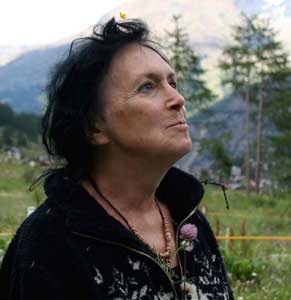“Volatile and Divisive”
 While reading Sandy Stone’s “The Empire Strikes Back: A Posttranssexual Manifesto,” I was struck by the easy and academic way in which Stone considered a charge levied against not only herself but transsexual people in general by Janice Raymond, who charged that “All transsexuals rape women’s bodies by reducing the female form to an artifact, appropriating this body for themselves…Rape, although it is usually done by force, can also be accomplished by deception.” Raymond goes on to criticize the way in which Stone herself occupied a position of power within a lesbian-feminist music collective, charging that after benefiting from male privilege “he” (Raymond only refers to Stone as he) had inserted himself into a situation which was dominating and divisive for women and was going to (she quotes another woman) “cash in on lesbian feminist culture.”
While reading Sandy Stone’s “The Empire Strikes Back: A Posttranssexual Manifesto,” I was struck by the easy and academic way in which Stone considered a charge levied against not only herself but transsexual people in general by Janice Raymond, who charged that “All transsexuals rape women’s bodies by reducing the female form to an artifact, appropriating this body for themselves…Rape, although it is usually done by force, can also be accomplished by deception.” Raymond goes on to criticize the way in which Stone herself occupied a position of power within a lesbian-feminist music collective, charging that after benefiting from male privilege “he” (Raymond only refers to Stone as he) had inserted himself into a situation which was dominating and divisive for women and was going to (she quotes another woman) “cash in on lesbian feminist culture.”
Stone must be used to this sort of thing, because if someone accused me of something as hurtful as raping women merely by inhabiting the body which I feel most comfortable inhabiting and living my life as the person I want to be, I don’t think I could’ve responded in such a measured way. I got stuck on this passage. I cannot imagine how it is a useful or constructive argument for understanding gender in any meaningful way, and (much worse) the use of rape in a theoretical context trivializes an experience which is incredibly traumatic for many people. The argument also makes feminism into something exclusive, which is in no way helpful to anyone working for equality.
I am interested in the possibility of coalition building, which was why I very much liked the actual Manifesto piece of Stone’s writing, which seemed to mostly boil down to 1) no more “wrong body” discourse, and 2) no more “passing,” and which put forth the possibility of solidarity between “gays, lesbians, and people of color” and other people who have “chosen invisibility as an imperfect solution to personal dissonance,” or who have felt themselves forced to do so my oppressive societal structures. Stone constructs this as a new kind of “transformation,” towards a more inclusive (to quote Angela Davis) Freedom Movement and society.

Comments are closed.